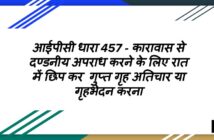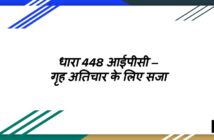Women and children are among the most vulnerable section of society and the progress of the country depends on how they protect and safeguard the rights and interests of their people. Sexual harassment, exploitation of women, and rape is the common phenomenon throughout the nation. The Supreme Court of India has in various landmark judgments made amendments to ensure that women and children are not made the victim of crime.
In this article, we will discuss what is rape under Section 375 of the IPC, its essential ingredients, exceptions, punishment under Section 376 of the IPC, and some landmark Supreme Court judgments.
Section 375 IPC – What is Rape?
Section 375 of the Indian Penal Code (IPC) states that if a person penetrates his penis, inserts any object or part of the body (other than the penis) or manipulates any part of the body to cause penetration, or applies his mouth to the vagina, anus, or urethra or any part of the body or makes her do same with him or someone else, under any of the following circumstances –
- Against her will,
- Without her consent,
- With her consent – when such consent is obtained by – a) putting her or any other person she is interested in, in fear of hurt or death, b) where she gives consent believing that such person is her husband and when in fact he is not and that person also knows that he is not her husband (misconception or misrepresentation), c) unsoundness of mind or intoxication or administration of stupefying or unwholesome substance through him or any other person on his behalf, due to which she is unable to understand the consequence and nature of consent.
- With or without her consent, in the case of a minor girl who is under the age of eighteen years.
- When she is unable to give or communicate consent.
Essential ingredients of Rape
The following essential ingredients should be fulfilled to constitute an offence of rape –
- If a man does an act of penetrating, inserting a penis or any object or manipulating any part of the body to cause penetration or applying his mouth against any part of the woman or any makes her do the same act with any other person.
- The act should be done against the will of the victim (the person being raped);
- The act should be done without her consent.
- If consent is given it should be given under pressure or fear of causing hurt or injury to the person she is interested in.
- The consent was given under misconception, fraud, misrepresentation, or mistake;
- Consent was given when the victim was not under the state of giving consent i.e. was unsound, under undue influence or intoxication;
- Consent is given by a minor;
- If the victim is unable to communicate her consent.
An exception to Section 375
The following acts do not amount to Rape –
- Medical intervention or procedure does not amount to rape.
- If a man has sexual intercourse or any sexual acts with his own wife who is above fifteen years of age, then it does not amount to rape. In the 1949 Amendment to IPC, the age limit of fifteen years was increased to eighteen years. However, in Independent Thought Vs Union of India, 2017, the court held that sexual intercourse with minor amounts to rape irrespective of whether such a person is married or not.
What is the punishment for Rape?
As per Section 376 (1), any person (except those mentioned below) who commits rape shall be punished with at least ten years of rigorous imprisonment which may extend to imprisonment for life and a fine.
(2) If any of the following persons namely;
a police officer, public servant, member of armed forces, the management or on the staff of a jail, remand home or other places of custody, or management or staff of a hospital, the person being in a position of trust or authority (relative, teacher, or guardian), or in a position of dominance;
or commits rape during sectarian or communal violence, or rapes a pregnant woman, or woman incapable of giving consent, or woman suffering from physical or mental illness, or commits rape on the same woman repeatedly, or causes grievous maims, bodily harm, or disfigures or endangers the woman’s life.
Then such a person will be liable for rigorous imprisonment of not less than ten years but up to imprisonment for life and a fine. Here imprisonment for life means imprisonment for the remaining life of the accused.
(3) If a person commits rape on sixteen years old girl, then such person shall be liable to undergo rigorous imprisonment which shall not be less than twenty years but up to imprisonment for the natural life of the accused and a fine. (The fine amount will be paid to the victim and it should be reasonable to meet the medical and rehabilitation expenses of the victim.)
Is it bailable?
Section 375 of IPC is a non-bailable, cognizable offence which is triable by the Court of Session.
Does Section 375 of the IPC include Marital Rape?
Marital Rape means undesirable sexual intercourse by a husband with his wife by unlawful force, threat, or physical violence, or when she is incompetent to give consent to such act.
In India, Marital Rape is not completely criminalized. However, Section 375 Exception 2 has excluded any acts of sexual violence in marriage from the concept of rape. Nevertheless, it also states that any sexual intercourse by a husband with his own wife who is below the age of fifteen years is regarded as rape, irrespective of whether there was consent or not.
Independent Thought Vs Union of India, 2013
In this case, the court was of the view that Exception 2 of Section 375 should be struck down as far as it relates to sexual acts with a wife below the age of 18 years on the grounds that it is discriminatory, whimsical, arbitrary and violative of Article 14, 15 and 21 of the Indian Constitution and is inconsistent with the provision of Prevention of Children from Sexual Offences (POCSO) Act.
Landmark Judgements on Section 375 IPC
Delhi Domestic Working Women’s Forum vs Union of India, 1994
In this case, the Petitioner had filed a PIL to support the condition of four domestic servants who belonged to a tribal community and were subjected to indecent sexual assault by some Army personnel while travelling in a train. The Petitioner had pleaded for the setting up of the National Commission for Women to set up a scheme for providing compensation and rehabilitation to the victims of crime.
Therefore, to protect the interest of the rape victims, the Court issued the following guidelines to assist them – the complainant should be given legal representation in sexual assault cases, legal support should be provided while going to the police station with the assistance of a lawyer, if the victim does not have any advocate to represent herself then there should be a list of advocates kept at the police station to act in such circumstances, maintaining the confidentiality of the victim, the establishment of Criminal Injuries Compensation Board to support the victims financially and also the court should provide compensation to the victim if the criminal is convicted. State authorities including the Director General of Police and the State’s Home Ministry should issue guidelines and instructions to others regarding how to deal with such cases and treat the victims of sexual assault, etc.
State of Karnataka Vs Mahabaleshwar Gourya Naik, 1992 (Suicide of victim)
In this case, the victim had committed suicide before the commissioning of trial because of which she was not available for examination. The Court had held that the accused was guilty under Section 375 and 511 (Attempt to commit offence) of the IPC as there was enough evidence to prove an attempt of rape if not rape, even though the victim is not available for examination due to death. Therefore, the non-availability of a victim cannot be a ground for the acquittal of the accused if there is other evidence to prove the criminal act of the accused.
Vishaka Vs State of Rajasthan and Ors., 1997 (Sexual harassment at a workplace)
In this case, a social worker, Banwari Devi, was in a program against child marriage, where she was successful in stopping child marriage in a Gujjar family. As a consequence, there was a protest against her. Ramakant Gujjar along with five other men gang-raped her in front of her husband in a brutal manner. The accused was acquitted by the Trial court due to a lack of evidence. Hence, she filed a writ petition before the Supreme Court.
The Supreme Court held that sexual harassment is a violation of the fundamental rights of women under Articles 14, 19, and 21 of the Indian Constitution. The Court also defined sexual harassment. Moreover, the Supreme Court gave guidelines to prevent the Sexual harassment of women in the workplace and rape. These include – Formation of a Committee for sexual harassment, the committee should be headed by a woman employee of the NGO, and the committee should help the victim regarding further course of action.
These guidelines came to be known as Vishaka Guidelines. It became legislation in the year 2013 as the Sexual Harassment at Workplace (Prevention, Prohibition and Redressal) Act, 2013.
Mukesh & Anr. Vs State for NCT of Delhi & Ors., 2017 (Nirbhaya Case / Delhi Gang Rape Case)
In this case, a girl and her male friend were returning home after watching a movie. They boarded a private bus that contained six people including the bus driver. The girl was brutally raped by the six men, while her friend was hit on his head with an iron rod by the bus driver. They threw the body of both the victim out of the running bus due to which they died on the spot. All the accused were arrested within 24 hours of the incident.
The Supreme Court declared the case as the “rarest of the rare case” and awarded the death penalty to the offenders.
This was a landmark judgment that gained a lot of public protests and henceforth the Court ordered the formation of the JS Verma Committee which laid down suggestions for amendment in various laws and strengthening the laws to deal with crime against women. Such as the concept of ‘consent’ under Section 114A of the Indian Evidence Act was enacted, the prohibition of cross-examination of victims relating to previous sexual experience or moral character, amendments to procedural aspects under CrPC relating to the video recording of statements before Magistrates, an investigation by woman police officers, the requirement of trial proceedings in camera, setting a time limit for completion of the inquiry, etc. The Committee had made a multidisciplinary approach that addresses all types of sexual crimes as well as suggested measures to prevent them and recommend punishments for these offences.
Shankar Kisanrao Khade Vs State of Maharashtra, 2013 (Child Sexual Abuse)
In this case, the victim was an eleven-year-old girl who was staying at Gunwant Maharaj Sansthan, in Lakhanwadi, and was enticed by a 52-year-old man and his wife who were in a position of trust. They took the girl to their son’s friend’s house and raped her at night while everyone was asleep. However, the owner of the house saw this and expelled all of them from the house. Later, in fear of apprehension, the old man strangulated the girl and left her body in the field. The strangulated body of the victim was found in the field after 48 hours after she went missing.
The Court had found the case falls under the category of the “rarest of the rare” case and sentenced the accused to death under Section 302 of the IPC and also imprisonment for life along with a fine.
The Court had also laid down guidelines to prevent child sexual abuse. These include – if any person who is in charge of any educational institutions, children’s homes, special homes, hostels, remand homes, etc. comes to know about any sexual abuse or assault of a minor has been committed by or against the minor then they should complain it to the nearest Special Juvenile Police Units (SJPU) or local police. If they fail to report a complaint, action will be taken against them. The Central and the State Governments should establish an SJPU in all the districts and should ensure to create awareness for the Protection of Children from Sexual Offences Act, 2012 through radio, television, newspaper, etc. The parents and guardians of the children should also be made aware of the Act.
Kathua Rape Case, 2018
In this case, an eight-year-old girl was abducted, drugged, raped, and killed by seven people in Kathua, Jammu & Kashmir. Of the seven offenders, the Court had convicted six of them. Among them, three convicts were punished with imprisonment for life and the remaining three were punished with imprisonment for five years. The eighth accused is a juvenile whose trial is yet to be tried.
Eventually, the Criminal Law (Amendment) Act, of 2018 amended Chapter XVI of the IPC to provide harsh punishments to the offenders for committing rape of 12-16 year of girls. Henceforth, a) the rape perpetrator who commits rape against a girl below the age of 12 years will be punished with 20 years of rigorous imprisonment which may extend to life imprisonment and a fine or death. b) committing gang rape of a girl less than12 years will be punished with imprisonment for life and a fine or death, c) rape of a woman under the age of 16 years will be punishable with up to 20 years of imprisonment or imprisonment for the rest of the life of the offender and a fine. d) rape of a woman over the age of 16 years will be punishable with up to 10 years of imprisonment.
Conclusion
In India, there are many laws to protect women. Rape is one of the crimes which is mostly used against women. Section 375 of the IPC deals with Rape. If a person does sexual intercourse with a woman, against her will or without her consent, then such a person will be punished under Section 376 of IPC. If a man who is in a dominant position, or holds the position of authority or a police officer, armed force, public officer, etc. commits rape against a woman, then such person will be liable for at least ten years of imprisonment which may extend to life imprisonment and fine. If a man rapes a sixteen-year-old girl then such a person will be punished with twenty years of imprisonment or up to life imprisonment. Section 375 is a non-bailable, cognizable offence that is triable by the Court of Sessions. With time, there are many amendments made to these laws to protect and safeguard the right of the victim.


